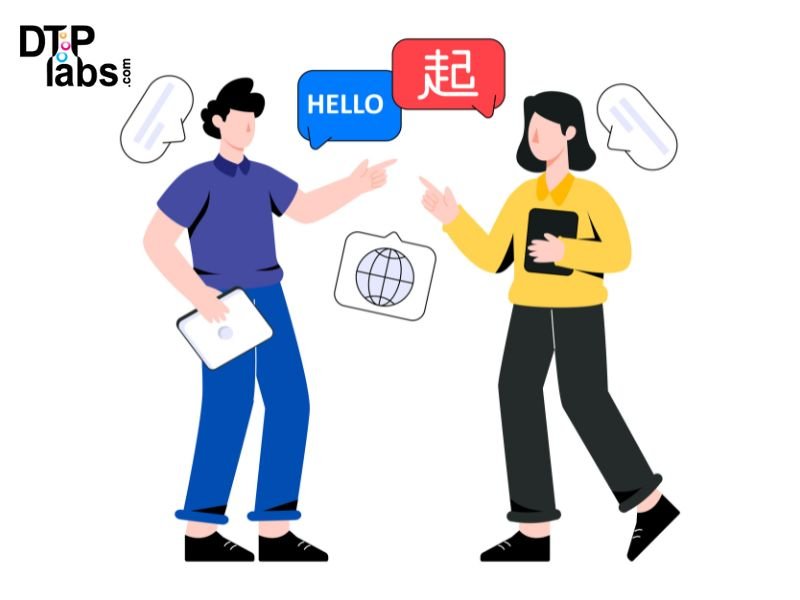Translation and localization are often confused with one another, but they are actually two very different things. Translation is the process of converting written text from one language into another, while localization is the process of adapting a product to a certain locale or market.
The language industry is dedicated to facilitating multilingual communication, both oral and written. This includes activities in translation, interpretation, subtitling and dubbing, software and website globalization, development of language technology tools, organization of international conferences, language education and language consulting.
What Is Translation?
Translating is changing a piece of writing or dialogue from one language to another. The translator must understand the context of the text to re-create it in another language properly. It is important to note that translation is usually between two languages that use the same alphabet and writing system. B. Chinese and English”. Translation can be thought of as changing text from one language to another, but not all changes are created equal.
What Is Localization?
Localization is the process of changing the text and media used in games, apps, websites, etc. to make them culturally relevant to end users. Localization also includes adjusting the narration for different markets (for example, replacing English narration with French). It is also important to note that localization usually occurs between two languages that use other writing systems (such as Chinese and English). Translating can be thought of as changing text from one language to another, while localizing changes the words and media used in a game or app.
Differences between Localization and Translation:
There is very little room for error; translations should be an accurate representation of the original text. Localization leaves more room for error, as not all good translations will fit the media correctly. The localization team must determine and implement appropriate replacements before finalizing the localized release.
Cost
Translating a piece of text is typically cheaper than localization. For example, it only takes a translator a few hours to resolve a website. At the same time, localization can take several weeks as translations and media changes are required. Localization involves changing text and media from one language to another.Availability of Resources
Translating a piece of text is typically easier than localizing. Only the translator is needed to solve the reader, whereas several people must localize it (e.g., translators, editors, graphic designers, audio engineers). Localization involves changing text and media from one language to another. It is much easier for a translator to translate a text than for a localizing specialist to localize that exact text.
Audience
Translations are often aimed at academics, hobbyists, etc., as the target audience only needs to understand the text itself. Localizing is typically done for video games and other media such as TV shows, apps, websites, etc. These forms of media must appeal to a wide range of people from different cultures. Localization involves changing text and media from one language to another.
Language vs. Culture
While translation is the transfer of text or dialogue from one language to another, localization is primarily about culture. Many differences between languages and cultures can affect translation and localization. For example, when translating a color term directly from English to Spanish, only the meaning of the word in both languages is considered. However, in some cultures, colors can be associated with feelings and concepts that do not exist in other cultures (e.g., green might mean jealousy in one culture, but it can represent envy or money in another).
Language Experience
Translators must have world-class knowledge of English and another language such as Spanish or Chinese. They also need an excellent understanding of both languages to understand a source document’s context and intent. In addition to good knowledge of the source language, a localizer must have extensive knowledge of the target language in which the product will be localized. They are responsible for providing their teams with all the resources needed to localize a product.
How important is localization?
Even after the translation in the targeted language, the content may not be suitable for the culture of the target audience. Forex a common phrase from one language someone cannot aptly translate into another Language, what may appear as popular expressions in one territory may not be appropriate in other regions. Forex what is ordinary for people in North America, may not appeal to the consumers of South-East Asia.
What is the impact of translation and localization?
In conclusion, using a combination of translation and localization services can help you gain a competitive advantage over local businesses and competitors by communicating ethically with your customers in their native language. As a result, it increases the prospects of sale of one’s product or services and helps in growing one’s business by leaps and bounds. This results in building a good brand across geographical boundaries.
Additionally, other changes, such as special symbols such as German umlauts, design, and even currency, would have to be adapted to the usage and beliefs of the people of this new region being targeted. One can miss such requirements after the translation of content. Nevertheless, content localization makes it possible to understand and adapt the content to a new target language, taking into account the culture, tastes and geography of the new market.
Final Thoughts
Localization and translation both play important roles in expanding the reach of a language. However, if you really want to resonate with your target audience when translating your content into another culture or language, localization is the best way to go.
DTP Labs is a Desktop Publishing company based in New Delhi, India. We offer book publishing Services, PDF to Word conversions, post-translation DTP, and E-Learning Localization Services to translation agencies worldwide. To avail of our services, check out our website www.dtplabs.com, or contact us at info@dtplabs.com.

